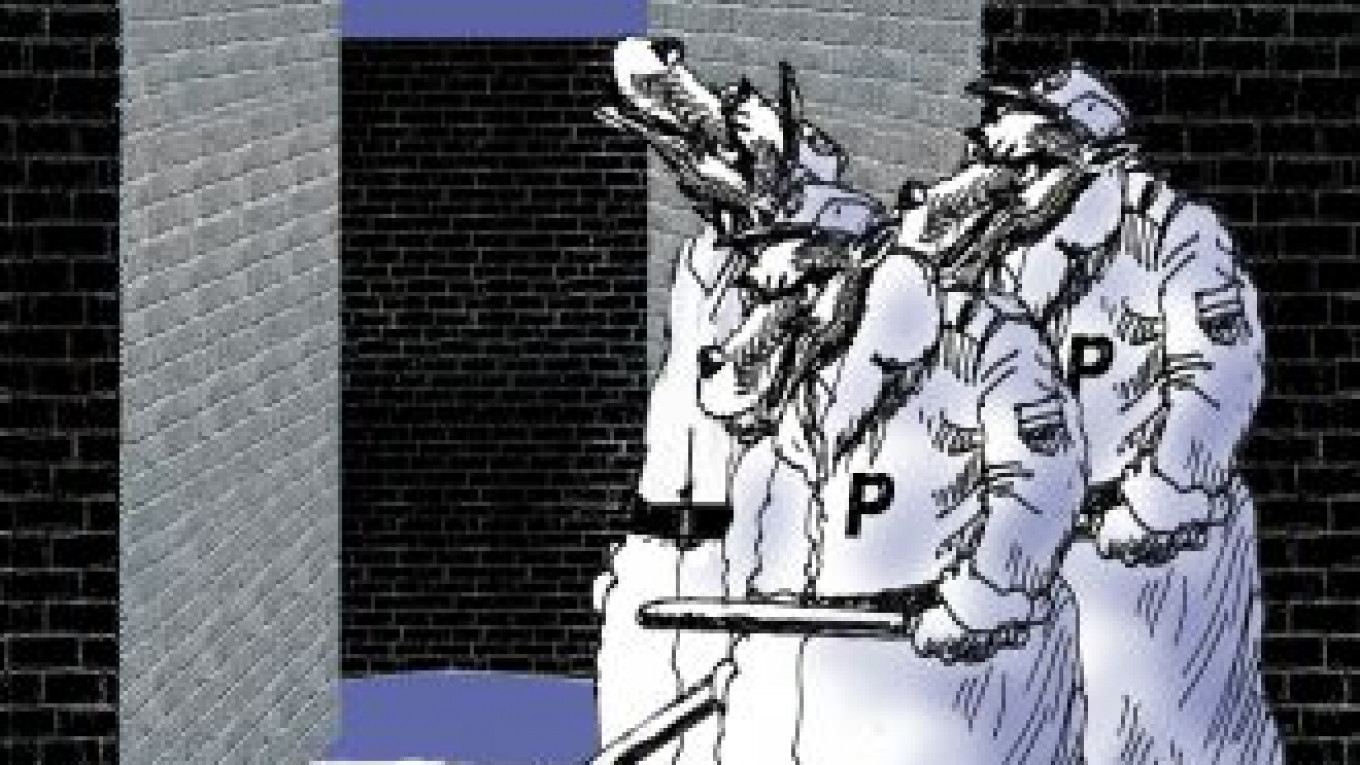The media first leaked the story of the death of 15-year-old Nikita Leontyev from St. Petersburg a day after it happened on Jan. 21. According to initial accounts, three policemen witnessed a pair of teenagers robbing a woman and kicking her in the head. The police reportedly intervened and detained one of the teenagers, Leontyev. According to official reports, the policemen did not lay a finger on the suspect, who allegedly was a drug addict and died in detention as the result of a seizure.
But soon after these media reports, the story radically changed. The police began feeding the public what appears to be one lie after another. First, instead of claiming that "no one laid a finger on him," the police contended that the young man had been beaten from head to toe. One of the police officers, Denis Ivanov, took responsibility by claiming to have beaten the boy with a shovel handle.
Then, Yevgeny Vyshenkov — deputy head of St. Petersburg-based media group The Agency for Investigative Journalism, which publishes Fontanka.ru and focuses on investigating the region's most notorious crimes — offered a more plausible version of events.
Vyshenkov explained that the three policemen had been drinking at their precinct when a woman ran in and told them she had just been robbed on the street. The youngest officer on duty, Denis Ivanov, was dispatched to deal with the problem. Sometime later, Ivanov hauled in Leontyev.
The police claimed in a summary that was compiled the next day that somebody reported a robbery to the police. But even that version, if it were true, is suspicious because there was no evidence of a crime, suggesting that Ivanov arrested Leontyev without justification. If the woman reported that her purse was stolen, why was Leontyev found without the purse and why was the woman unable to identify Leontyev as her assailant? On what grounds did the policeman, Ivanov, haul in a teenager from a good family whom he happened to find in a nearby neighborhood?
What's more, Vyshenkov discovered the name of the "crime victim" — Svetlana Kuzmina, a 47-year-old alcoholic who lives in a decrepit apartment next to the precinct.
The fact that Kuzmina is well acquainted with the three policemen suggests the following: Three drunk cops were walking down the street when they began quarreling with two teenagers for some reason. They hauled one of them, Leontyev, down to the precinct and killed him. Afterward, when they realized they had a corpse on their hands, they dragged in the alcoholic Kuzmina from the nearby building and forced her to write a statement accusing the youth of trying to rob her.
Subsequent events are not difficult to piece together. Senior police officers arrived on the scene and said, "Well, boys, looks like you got a big problem. There is a corpse in the precinct, and somebody has to take the blame for it."
And the one to take the blame was, of course, the youngest policeman — Ivanov. After that, the police chief reported that the case had been solved because one of the police officers admitted to beating the young man in a fit of rage with a shovel handle. Strangely, this ingenious version incriminated the other officers. After all, what were they doing when Ivanov was pummeling an innocent teenager to death? Why were they just sitting around watching the show?
Russian cops differ from violent criminals only in the sense that the criminals kill people in dark alleyways and the people they prey on are considered crime victims. When cops kill, they do so at their leisure, and their victims are charged with fabricated crimes.
In the evening on Jan. 21, Leontyev, a good kid from a middle-class family, was still alive and living the normal life of a Russian teenager. Then he crossed paths with some degenerate cops. Three hours later Leontyev was dead. His killers claimed that the boy was a drug addict, that he had robbed a woman and was kicking her in the head, and that they never laid a finger on him.
The same thing could happen to anyone in Russia.
Yulia Latynina hosts a radio talk show on Ekho Moskvy radio.
A Message from The Moscow Times:
Dear readers,
We are facing unprecedented challenges. Russia's Prosecutor General's Office has designated The Moscow Times as an "undesirable" organization, criminalizing our work and putting our staff at risk of prosecution. This follows our earlier unjust labeling as a "foreign agent."
These actions are direct attempts to silence independent journalism in Russia. The authorities claim our work "discredits the decisions of the Russian leadership." We see things differently: we strive to provide accurate, unbiased reporting on Russia.
We, the journalists of The Moscow Times, refuse to be silenced. But to continue our work, we need your help.
Your support, no matter how small, makes a world of difference. If you can, please support us monthly starting from just $2. It's quick to set up, and every contribution makes a significant impact.
By supporting The Moscow Times, you're defending open, independent journalism in the face of repression. Thank you for standing with us.
Remind me later.






